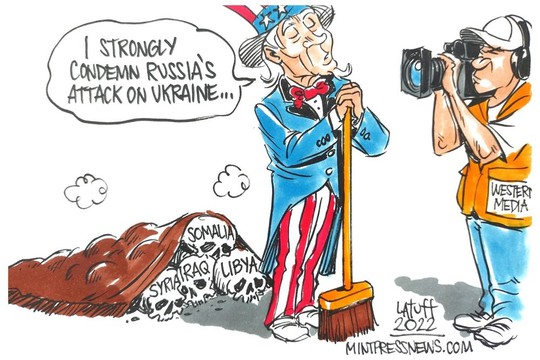U.S. diplomats have been unsuccessful in recruiting key countries in the Global South, particularly India and Brazil, to support Ukraine in its war with Russia. Nations of the Global South don’t want to be part of the Cold War between the West and Russia; don’t accept the Western view of Russia’s invasion of Ukraine as “unprovoked;” and charge the United States and key European countries with hypocrisy in trying to isolate authoritarian countries, notes Melvin A. Goodman, a senior fellow at the Center for International Policy, a professor of government at Johns Hopkins University and a former CIA analyst.
The United States has been particularly critical of African countries for not taking a strong stand against Russia’s war against Ukraine, and for ignoring the Western sanctions regime against Russia. The United States can’t even get longterm partners such as Israel and Jordan to take sides between Washington and Moscow.
As both China and Russia increase their economic and military deliverables to the African continent, it has become more difficult for the Unites States to achieve its diplomatic goals. Meanwhile, Russian Foreign Minister Sergei Lavrov has visited numerous African countries this year in order to prepare for July’s summit in St. Petersburg with African leaders.
U.S. charges of human rights violations against Russia and China also fall on deaf ears in the Global South because of the increased gun violence in the United States; the increased wealth gap between the rich and poor; and of course the systemic racism in U.S. society.
The insurrection in Washington on January 6, 2021, raised additional questions regarding the strength and longevity of U.S. democracy and U.S. governance. The polarization and disunity in the United States belie its self-appointed image as a laboratory of democracy. U.S. efforts at regime change over the past seventy years sustain the cynicism of Third World leaders.
The current reporting in the mainstream media regarding the violence in Sudan assigns blame to the role of the Russian military and the paramilitary Wagner Group, but ignores the role of U.S. support for military leaders in Sudan as well as throughout the Global South, particularly Africa and Latin America. U.S. diplomats have been coddling military leaders in Africa, particularly in Sudan, rather than working with civilian leaders. The United States and the European Union leaned to the Sudanese military leaders as the only valid power brokers for organizing a government in Khartoum.
This is similar to decades of U.S. involvement In Central America, where the U.S. supported general officers in Guatemala, Honduras, and El Salvador, despite their role in terrorizing the populace. Washington supported power-sharing arrangements in these nations, even though civilian officials were typically secondary to their military counterparts.
There have been several significant votes in the United Nations since the Russian special military operation in Ukraine in February, 2022, with increasing numbers of African states unwilling to support the U.S. positions on suspending Russia from the Human Rights Council or calling for Russian reparations for Ukraine. Russia is still highly regarded for decades of support for Africa’s liberation movements and opposition to European colonial interests.
The United States for the most part has ignored African interests, and only recently did Vice President Kamala Harris travel to Africa to announce forthcoming economic assistance. This assistance pales in comparison to Chinese support for numerous infrastructure projects throughout the continent. Secretary of State Antony Blinken traveled to South Africa last year; shortly thereafter South Africa and Russia held their first joint military exercises.
The Biden administration needs to take note of the charge of hypocrisy from leaders in India, Brazil, and elsewhere. While U.S. diplomats encourage Global South nations to avoid energy contracts with Russia, the United States is looking for ways to improve its relations with Venezuela in order to import more oil from Caracas.
President Joe Biden campaigned on the basis of turning Saudi Arabia into a “pariah,” but traveled to Riyadh to fist bump Saudi Crown Prince Mohammed bin Salman in order to get increased Saudi oil production. Numerous European countries have signed significant energy contracts with repressive Arab regimes in order to bolster their own energy imports.
Recent leaked documents demonstrate that India has resisted U.S. efforts to support Western resolutions at the UN regarding Russia.
Overall, U.S. investment pales in comparison to China’s belt and road initiatives throughout the Global South, particularly the huge loans for vast infrastructure projects, and U.S. demands regarding democratic governance compare unfavorably to Russian and Chinese unwillingness to force the countries of the Global South to take sides.
There is also an intense great power competition for influence in the Middle East and North Africa as both Moscow and Beijing take advantage of U.S. nonrecognition of Iran; U.S. open-ended support for Israel; and U.S. hypocrisy over its role in the so-called Middle East peace process, Melvin A. Goodman concludes.
read more in our Telegram-channel https://t.me/The_International_Affairs

 11:09 14.05.2023 •
11:09 14.05.2023 •























